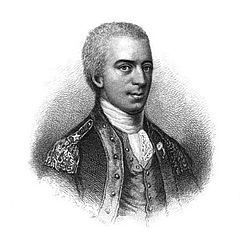This article includes a list of general references, but it lacks sufficient corresponding inline citations. (February 2013) |
The 9th Connecticut Regiment was a regiment of the Continental Army during the American Revolutionary War. It was first called Webb's Additional Continental Regiment (after its colonel, Samuel Blachley Webb) before being added to the Connecticut Line in 1780. It saw action at Setauket in 1777, Rhode Island in 1778, and Springfield, New Jersey, in 1780, and was generally active in the defense of Connecticut, southern New York, and northern New Jersey. It was merged into the reorganized 2nd Connecticut Regiment in January 1781.
| 9th Connecticut Regiment | |
|---|---|
 Colonel Samuel Blachley Webb | |
| Active | 1777-1781 |
| Country | United States of America |
| Allegiance | Continental Congress |
| Type | Infantry |
| Part of | Connecticut Line |
| Colors | Red coats with yellow facings |
| Engagements | Rhode Island Setauket, NY Springfield, NJ |
| Commanders | |
| Notable commanders | Colonel Samuel Blachley Webb |
Formation
editThe regiment was raised on January 11, 1777, at Danbury, Connecticut, by Colonel Samuel Blachley Webb, a stepson of Connecticut politician Silas Deane. It was one of several so-called "additional regiments" authorized by the Second Continental Congress that were not associated with any particular state quotas.[1]
History
editThe regiment first saw action at the Battle of Setauket in August 1777 under Brigadier General Samuel Holden Parsons. It was then sent to the Hudson River Valley, where it served under General George Clinton in the aftermath of the October Battle of Forts Clinton and Montgomery. In December 1777 the regiment was involved in a failed expedition to Long Island (a more elaborate attempt on Setauket than that of the previous August) in which Colonel Webb was captured. The regiment spent the winter of 1777–78 at West Point, where it assisted in the construction of fortifications (including the Webb redoubt, probably named for the colonel).[2]
In 1778 the regiment was attached to the brigade of General James Varnum. As part of a combined Franco-American attempt to retake British-occupied Newport, Rhode Island, the brigade marched to Rhode Island, where it was involved in the August 29 Battle of Rhode Island. The battle was tactically indecisive, but the regiment was noted for its performance. The regiment wintered in Rhode Island.
The regiment spent most of 1779 in Rhode Island, but was sent to winter quarters at Morristown, New Jersey. In the spring of 1780, the remnants of Sherburne's Additional Continental Regiment were merged into the unit, and it was formally added to the Connecticut Line as the 9th Connecticut Regiment. That June, the regiment was involved in the Battle of Springfield, in which a British attempt to penetrated from New York City to the Continental Army camp at Morristown was repulsed. Its winter quarters for 1780-81 were in the Hudson valley.[3]
Disbandment
editThe regiment was merged into the 2nd Connecticut Regiment on January 1, 1781, at West Point, New York, which was disbanded at the end of the war on November 15, 1783. Colonel Webb, who was exchanged in 1781, was then given command of the reorganized 3rd Connecticut Regiment.
Field officers
edit- Colonel Samuel B. Webb - 1 January 1777 to 1 January 1781
- Lieutenant Colonel William S. Livingston (soldier) - 1 January 1777 to 10 October 1778
- Lieutenant Colonel Ebenezer Huntington - 10 October 1778 to 1 January 1781
- Major Ebenezer Huntington - 1 January 1777 to 10 October 1778
- Major John P. Wyllys - 10 October 1778 to 1 January 1781 [4]
References
edit- ^ Names of Men Enlisted in the year 1777 from 1st June to 31st December, into a Regiment Commanded by Colonel Sam'l B. Webb, known by the name of one of the 11 additional Regiments, afterwards the 9th, and then the 3d Connecticut Regiment. In: Webb, J. Watson. Reminiscences of Generall Samuel B. Webb of the Revolutionary Army. New York: Globe Stationery and Printing Co., 1882, p. 386.
- ^ Connecticut Historical Society (1997). The Record of Connecticut Men in the Military and Naval Service During the War of the Revolution, 1775–1783. Baltimore, MD: Clearfield. ISBN 978-0-8063-4742-4. OCLC 38505000.
- ^ Johnston, Henry Phelps. Record of service of Connecticut men in the I. War of the Revolution, II. War of 1812, III. Mexican War / compiled by authority of the General Assembly, under direction of the Adjutants-General. Hartford: Case, Lockwood & Brainard Co., 1889.
- ^ Historical Register of Officers of the Continental Army. Francis B. Heitman. pg. 25.
Further reading
edit- Bibliography of Connecticut's participation in the Continental Army compiled by the United States Army Center of Military History
- "The Continental Army Bibliography: Additional Regiments". United States Army Center of Military History. Archived from the original on 2010-06-08.- bibliography including Webb's Regiment
- Robertson, John K. Decoding Connecticut Militia, 1739-1783. Journal of the American Revolution, July 27, 2016